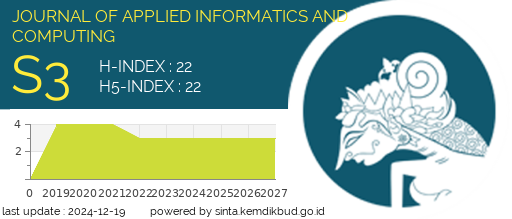Aplikasi Edukasi Kuis Matematika Untuk Tingkat Sekolah Menengah Pertama Berbasis Android
DOI:
https://doi.org/10.30871/jaic.v4i1.1647Keywords:
Education, Quiz, Math, AndroidAbstract
Mathematics is a science that is widely used in everyday life such as used in trade transactions, carpentry, and so on. But until now many people think that mathematics is a subject that is considered difficult and difficult to understand, especially for junior high school students. Though mathematics itself has been taught starting from the level of childhood and elementary school. Because learning methods still use conventional methods such as the ability to write and count, this is what makes students feel bored because moreover some students do not like these math subjects. Not only in terms of subjects and learning media is still conventional in nature that is only based on the book. For this reason, a learning media is created which is packaged in an android-based application by including elements of mathematics learning in it. The application that was designed was a junior high school level mathematics education quiz application, with the aim of training students 'ability to count, train their memory and increase students' interest in learning in mathematics.
Downloads
References
A. Ikwan, M. S. Mauluddin, And Mustagrifin, "Prosiding Snst Ke-8 Tahun 2017 Fakultas Teknik Universitas Wahid Hasyim Semarang 65," Pros. Snst, Pp. 65"“69, 2017.
I. Kurniawan, T. D. Tambunan, And I. L. Sardi, "Game Pembelajaran Matematika Untuk Anak Sd Kelas 1 Dan 2 Berbasis Android Menggunakan Construct 2," Vol. 1, No. 3, Pp. 2088"“2094, 2015.
Y. Aprilianti, U. Lestari, And C. Iswahyudi, "Aplikasi Mobile Game Edukasi Matematika Berbasis Android Application Of Education Mobile Games For Math Based On Android," Script, Vol. 1, No. 1, Pp. 89"“97, 2013.
S. A. Pramuditya And M. S. Noto, "Desain Game Edukasi Berbasis Android Pada Materi Logika Matematika," Vol. 2, No. 2, Pp. 165"“179, 2018.
M. N. Jannah And F. N. Hakim, "Rancang Bangun Aplikasi Huruf Hijaiyah Berbasis Android ( Studi Kasus : Taman Baca Al Quran Raziev Reinezhwa Banjarmasin Kalimantan Selatan )," Teknol. Inf. Dan Komuniakasi, Vol. 6, No. 2, Pp. 53"“59, 2015.
R. Hartono, A. Purnomo, N. A. Kurdhi, And H. I. Firdiana, "Pembuatan Game Edu Kasi ' English For Fun ' Untuk Anak Kelas 1-2 Sd Berbasis Android Menggunakan Unity 3d," Vol. 7, No. 2, Pp. 521"“526, 2016.
F. A. Rizal, B. Suyanto, And T. R. Yudantoro, "Aplikasi Game Edukasi Matematika Dengan Konsep Aritmatika Anak," Pp. 45"“50.
M. Z. Asghar, K. Nasir, F. M. Kundi, I. Sana, H. Iqbal, And S. Ismail, "Quizzes : Quiz Application Development Using Android-Based Mit App Inventor Platform," Vol. 7, No. 5, Pp. 43"“54, 2016.
Y. Amrizal And R. Kurniati, "Game Aritmatika Berbasis Android," Inovtek Polbeng, Vol. 1, No. 2, Pp. 100"“104, 2016.
W. Setyaningrum And N. Waryanto, "Developing Mathematics Edutainment Media For Android Based On Students' Understanding And Interest : A Teachers' Review Developing Mathematics Edutainment Media For Android Based On Students ' Understanding And Interest : A Teachers ' Review," ICMSE2017, pp. 1"“6, 2018.
Downloads
Published
How to Cite
Issue
Section
License
Copyright (c) 2020 Yulia Yulia

This work is licensed under a Creative Commons Attribution-ShareAlike 4.0 International License.
Authors who publish with this journal agree to the following terms:
- Authors retain copyright and grant the journal right of first publication with the work simultaneously licensed under a Creative Commons Attribution License (Attribution-ShareAlike 4.0 International (CC BY-SA 4.0) ) that allows others to share the work with an acknowledgement of the work's authorship and initial publication in this journal.
- Authors are able to enter into separate, additional contractual arrangements for the non-exclusive distribution of the journal's published version of the work (e.g., post it to an institutional repository or publish it in a book), with an acknowledgement of its initial publication in this journal.
- Authors are permitted and encouraged to post their work online (e.g., in institutional repositories or on their website) prior to and during the submission process, as it can lead to productive exchanges, as well as earlier and greater citation of published work (See The Effect of Open Access).











